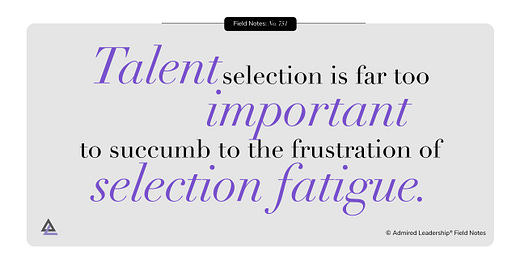High standards sometimes slow down key decisions to the point of frustration. Leaders who reject inferior answers or solutions until the team finds a better one can wear people down.
The temptation to accept a workable decision becomes ever stronger as time marches on and yet another choice has been classified as substandard. Fatigue can set in and undermine the enthusiasm and commitment to a rigorous decision-making process.
Over time, a leader who desires to hold high standards succumbs to the team pressure of settling the issue. Or the leader simply loses interest and accepts a second-rate choice. This is an especially common situation when teams and leaders are working to select talent.
Sourcing, interviewing, and selecting talent is hard enough without a ridiculously high bar, yet everyone agrees that making a great choice is critical to future team success. Good leaders know that the quality of new team members shapes the pathway forward. So they dig in, set the standards for selection, and refuse to budge.
In some cases, candidate after candidate will fail to meet the mark. The team grows weary of the process and becomes impatient to put the selection behind them. At a certain point, they are willing to accept any warm body just so they can move on to other tasks.
Leaders are not immune to the same fatigue. As the rejection pile grows, everyone is ready for the process to end. Somewhat ironically, the talent choice made after selection fatigue has worn down the team ends up being more than a compromise. Candidates considered earlier in the process are often deemed stronger than the choice the team settles on in the end.
This is no way to run a railroad.
The answer to this common dilemma is not to lower the standards for talent selection. Nor should a team make a quick decision to accept an early candidate thought to be “close enough.” Talent selection is far too important to succumb to the frustration of selection fatigue.
The better answer is to employ systems thinking to the recruiting and selection process itself. In accordance with this way of viewing the problem, any time a system consistently fails to produce the desired outcome, the answer is not to repeat the same process but to change the system. In the case of talent selection, this means swapping out a critical element of the existing system.
Examples: Using a different talent source, recomposing the selection team, administering alternate diagnostics, asking candidates different questions, adding a new step in the reference process, or requiring a demonstration of the candidate's skills.
Any real change in the system has the potential to break the logjam. Great leaders don’t lower their standards for talent nor submit to selection fatigue. Instead, when the candidates begin to pile up, they change the system.





Fun 15 minute discussion of this Field Notes entry here. Moneyball fans will appreciate the conversation… https://twitter.com/admiredleaders/status/167369884800960512
I have seen this situation many times. Another wrinkle is that too often the “high standards” are based on arbitrary superficials. So, yes, set a high bar but don’t confuse irrelevant standards, such as where someone went to school, with rigor.